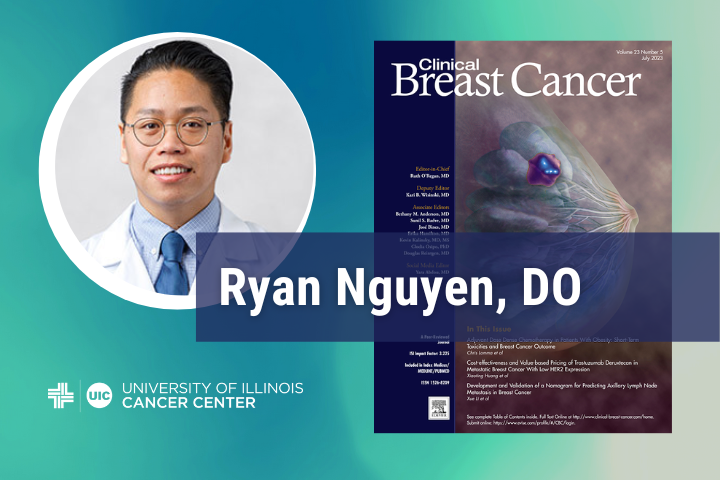
University of Illinois Cancer Center members are authors of a study in the journal Clinical Breast Cancer that reports Black patients were underrepresented relative to White, Hispanic and Asian patients in pivotal clinical trials leading to FDA approvals for breast cancer from 2010 to 2020.
Ryan Nguyen, DO, a member of the Cancer Center’s Translational Oncology research program, is first and corresponding author of the study entitled “Race and Ethnicity Reporting and Enrollment Disparities in Clinical Trials Leading to FDA Approvals for Breast Cancer Between 2010 and 2020.” Cancer Center Deputy Director VK Gadi, MD, PhD, and Zhengjia Chen, PhD, Director of the Cancer Center’s Biostatistics Shared Resource Core, also are authors, as is Jun Lu, a PhD student in biostatistics at the University of Illinois Chicago (UIC). Yomaira Silva, MD, formerly a medical student at the University of Illinois College of Medicine Chicago but now a resident physician at Massachusetts General Hospital in Boston, also is an author.
About the Study
The authors collected enrollment and reporting data from clinical trials leading to FDA novel and new use approvals for breast cancer from 2010 to 2020 from Drugs@FDA, ClinicalTrials.gov and journal manuscripts. They compared enrollment demographics with U.S. cancer population estimates.
“Despite policies meant to increase diversity in clinical trials, we found no significant difference in race and ethnicity reporting for trials leading to FDA approvals in breast cancer from 2010 to 2015 compared with 2016 to 2020. Black patients were consistently underrepresented in these pivotal trials relative to their U.S. cancer incidence,” the authors conclude.
The study goes on to suggest ways investigators, sponsors, regulators and policymakers could improve minority participation in clinical trials.
“Because of the systemic underrepresentation and underreporting of minority populations in breast cancer trials, it is imperative to ensure future trials adopt innovative methods to assure the scientific benefit is distributed equitably,” they concluded.
